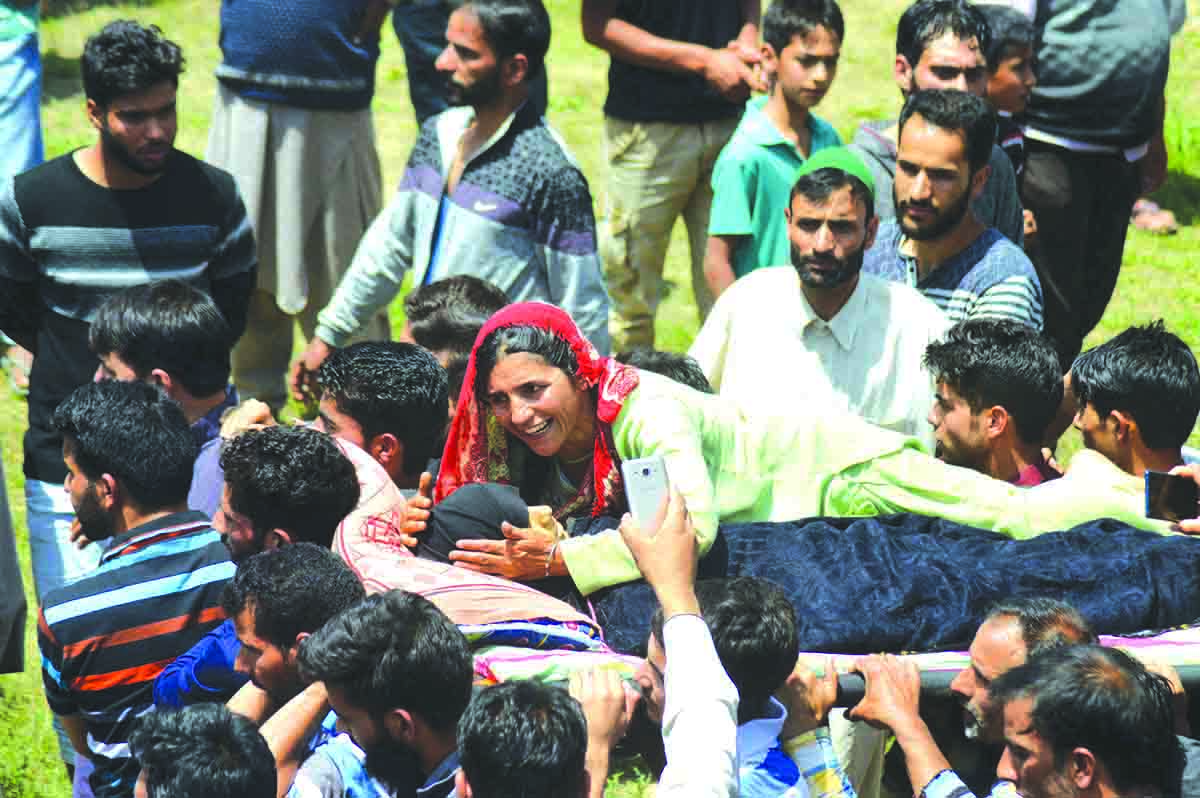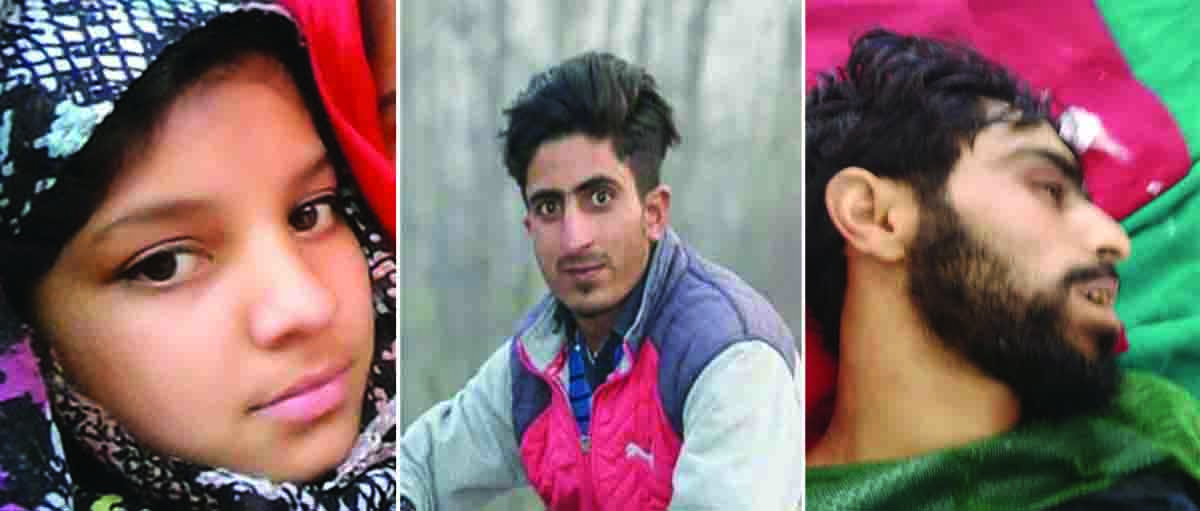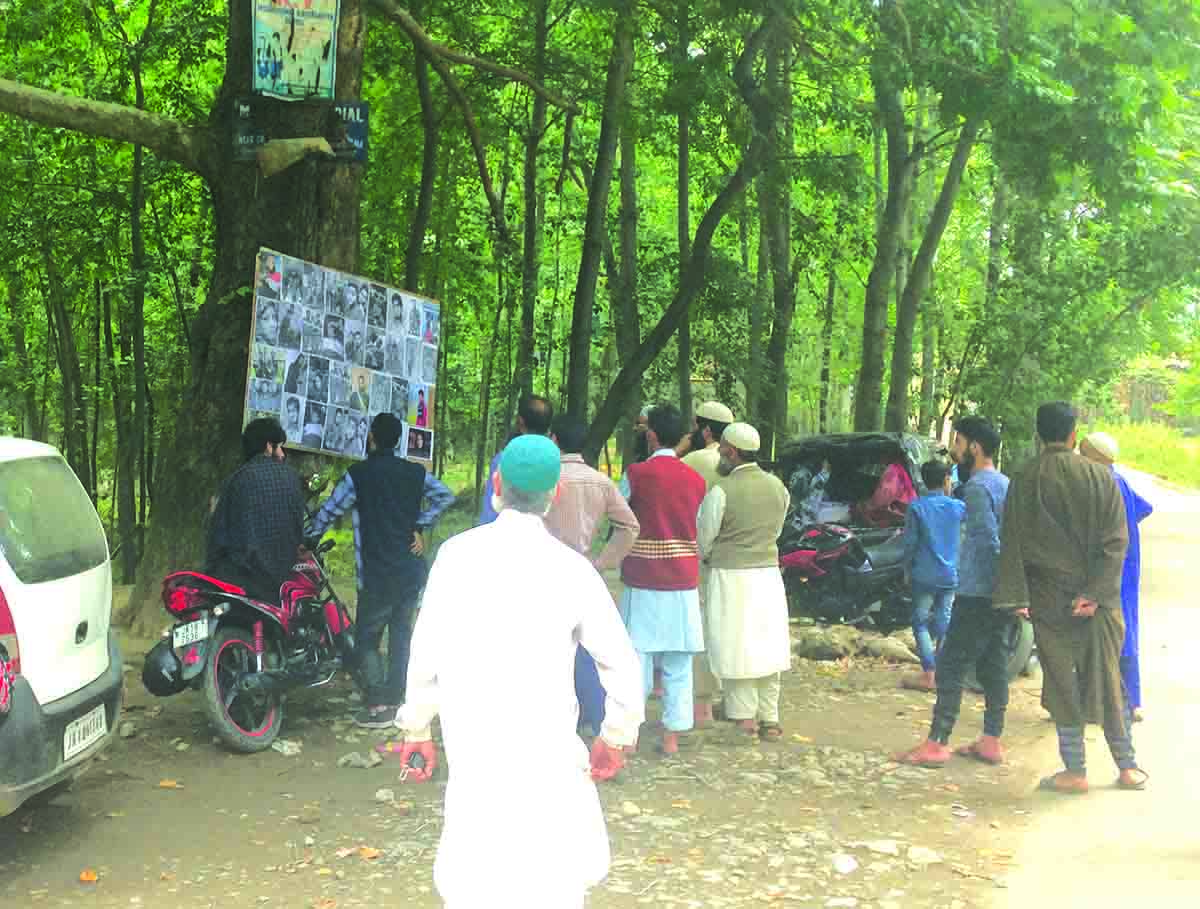A good boy’s sweet dream sent the entire village to clear the graveyard from weeds and shrubs and minutes later soldiers came and sent the coffins, reports Shams Irfan

On July 7, 2018, Shakir Ahmad Khanday, 22, a first year bachelor’s student, along with half-a-dozen boys from the neighbourhood, volunteered to weed out their ancestral graveyard in sleepy Hawoora village of south Kashmir’s Kulgam. The decision for weeding the graveyard was taken after a local boy, known for his piety in the area, was told so in his dream. “A voice had told him (the pious boy) to get it cleaned,” said Ali Mohammad Alie, 45, Shakir’s paternal uncle, a labourer, who is better known as Lambarder’s (village heads) son. “So, almost everyone volunteered.”
The next day, at 8:30 am, Shakir, who lived in a modest two storey house, barely five hundred metres from the village graveyard, took locally made tools from home and joined other boys there. Clearing the cemeteries of the wildly growing shrubs and grasses is normally a seasonal activity in the villages. Earlier the graveyards were open and the cattle would graze on this grass but the fenced graveyards is in fashion.
It was a hot summer day. The sun was harsh and scathing. But the sense of doing something good and rewarding, kept Shakir and other village boys going.
Almost same time Shakir’s cousin Andleeb, a Class VII student at local Government Middle School, started her day, as she headed to school, located at five minute’s walk from her home. Apart from books, Andleeb was carrying her recent marks-sheet; her father had given the previous night as it spelled her name incorrectly.
At 10:30 am, as Shakir and other boys started packing their tools after their early morning toil, three army vehicles, carrying soldiers of Charlie Company from nearby Frisal garrison, made their way into Hawoora.
Barring the sound of their diesel engines, and a few fearless birds flying over them, Hawoora was quite a day before Burhan Wani’s second death anniversary. After the army vehicles crossed an aged Chinar (maple tree), planted on the roadside, near Shakir and Andleeb’s houses, they went straight towards Astan Mohallah, one of the dense localities between Redwani and Hawoora. “Without any provocation they started ransacking whatever came in their way,” said Shahid, an eyewitness, who refused to reveal his real name.

A few boys, who were sitting near the spot, reacted by pelting stones at them. In retaliation, army charged towards them, and as they reached near Government High School, in session at that time, they started beating its iron gates. After hearing commotion outside, an alert teacher got the main gate locked down. But to everyone’s surprise, a few army men climbed the iron-gate and jumped inside. Once inside, they went from one classroom to another, all the while shouting, and finally dragged a Class IX student out with them. “They also dragged a few girl students and beat teachers,” alleged Fayaz, a local.
By the time army men came out of the school along with the Class 9th student, a small group of boys had assembled a few meters away. Shakir, who after leaving his tools at home, came rushing out to see what was happening.
Shakir, and few other boys were barely fifty metres away when army spotted them walking towards the school, where teachers and children cried in horror.
“All of a sudden they started firing bullets towards them,” recalls Adil, a local boy who was standing nearby.
The first round of bullets hit Shakir and he fell down. As blood started to come out of his belly, he tried to plug the wound with his hands. The sound of gunshots terrified everyone, making people run for their lives. Instantly, there were desperate cries for help, from all directions. “The army vehicles, like seen in the movies, moved slowly as they fired randomly towards people,” said Adil.
Sajad, who managed to save himself at the nick of time by hiding behind a wall, recalls how an army man fired towards a shop, thinking boys are hiding behind its closed shutter. “His intentions were clear. He wanted to kill,” said Sajad, a local boy who refused to give his real name fearing for his life.
However, instead of boys, who had managed to save themselves, bullets hit the closed shutter, and a tin shed next to it, where a helpless calf was tied. To everyone’s surprise the calf survived with two bullets in her upper body. But not everyone was as lucky as the voiceless creature.
Two cousins, one fate
With a bullet in his abdomen, when Shakir struggled to move out of slow moving army vehicle’s way, a few daring boys decided to pick him up. “But we too were shot at,” said one of them.
The hue and cry outside alerted Shakir’s first cousin Andleeb and her two elder sisters. “A neighbouring woman told us that Shakir is shot,” recalls Andleeb’s father Alie.
Followed by her sisters and few neighbouring women, Andleeb quickly rushed out of her house and tried to reach the spot where Shakir was lying on the road; slowly bleeding to his death. “They (Shakir and Andleeb) were more than cousins. They were like brother and sister,” said Andleeb’s father.
When Andleeb and her sisters saw Shakir lying on the ground, in a pool of blood, they rushed towards him, with an intention to help him to safety. But army men, who were approaching towards them, shot another round of bullets. “They (army) were barely hundred metres away when they fired,” Alie said eyewitnesses told him.
While her sisters and other women managed to save themselves by taking shelter behind a row of under-construction shops, one bullet hit Andleeb. “They didn’t allow us to pick her up for around three minutes,” said Andleeb’s father, who came rushing out after hearing cries. “The poor girl was continuously bleeding.”
Almost same time, Irshad Ahamd Lone, 24, a local boy who worked at a saw-mill where he would assembles apple boxes, was spotted by the army, while walking towards his house. Before he could have crossed the road and entered a lane leading to his house, he was shot in the abdomen. “I was standing across the road and saw him get shot,” said Irshad’s younger brother Junaid, who looked helplessly as his brother bled just ten feet away.
When Junaid, 20, tried to run towards his brother and help him, a volley of bullets were fired towards him too. “Unlike my brother, I was lucky that bullets didn’t hit me,” said Junaid. “Then I took an alternative route and called my other brothers for help.”
Sixth among seven siblings Junaid called his elder brother Zahid, 22, who was at that time near the village graveyard. But little did Junaid know that Zahid too was caught by the army men, who had taken another route to corner boys, and shot him five times: three bullets in the right leg and two in the left.
With Shakir, Andleeb and Irshad shot in a matter of minutes, on a stretch of barely three hundred metres, between Astan Mohallah and Hawoora, there was chaos everywhere.
Death and hope
After bleeding on the road for about three minutes, Andleeb was picked by her sisters and a few neighbours, and sneaked out towards Frisal, the nearest health centre 3 kilometres away. But Shakir and Irshad were still on the road. “They (army) didn’t let anyone go near them. Whosoever tried, they fired at him,” said Junaid.

As the main road between Hawoora and Firsal was still under army’s control, Andleeb’s sisters and her father carried her through paddy fields, while desperately trying to stop her from bleeding. After running around 200 meters, at Mashkora bridge, they saw a local carpenter, riding towards them on his scooter. “A few boys sitting nearby came running to help us,” recalls Andleeb’s father.
Then, trying to be as quick as possible, they shifted Andleeb in the middle of the scooter, with carpenter on the driving seat, and a local boy in the back. “As they rode towards Frisal hospital, me and my daughters began running after them,” said Andleeb’s father.
After walking for five minutes they finally got lift from a vehicle which took them to the Frisal hospital, where Andleeb was already declared brought dead.
At the hospital Andleeb’s father came to know that Shakir too was declared dead upon arrival, a few minutes before his daughter reached there. “It was twin tragedy for us. I lost my daughter and my nephew within half-an-hour,” said Andleeb’s father.
A few minutes later Irshad too was brought to the same hospital, where he was declared dead within minutes of his arrival. While Shakir and Andleeb’s dead bodies were brought back in private cars, Irsahd’s was sent home in an ambulance. “I was on way to Firsal hospital when I saw an ambulance speeding towards our village,” said Irshad’s father Abdul Majeed Lone, a labourer. “When I asked who is inside, someone shouted my son’s name.”
As there was no one from Irshad’s family inside the ambulance, it sped away leaving his father alone on the deserted road, and in tears.
Irshad’s father had no idea about his other son Zahid, who was tied to a tree after being shot in both legs and then beaten. A few boys came to his rescue and untied him after the army left. It was these boys who took him to Frisal hospital, from where he was shifted to Islamabad, and finally sent to Srinagar’s Bones and Joints Hospital.
The vehicle carrying Andleeb’s body was stopped near Mushpora Bridge by the army men, who wanted them to turn back as Hawoora was sealed. They were allowed to pass when a cousin, who was accompanying Andleeb’s body, lost control and shouted at them: ek choti bacchii ko maar ke dil nahi bhara (Aren’t you content after killing a small girl).
The rest of the fifteen minutes journey from the Frisal hospital to Andleeb’s house was painfully long for those accompanying her. “How could they kill a child,” asks her cousin.
Wishing a miracle
Within a span of five minutes, both Shakir and Andleeb, who lived side-by-side, reached home, but dead. Shakir was the brother Andleeb didn’t have, and she a sister, he always wanted. But to everybody’s surprise, as Andleeb’s body reached home, she opened her eyes one final time. “We quickly took her back to the hospital, this time in nearby Qaimoh village,” said Andleeb’s father.
But as it turned out, this was not the day meant for miracles. Andleeb was declared brought dead at Qaimoh too, a second time in a single day.
As the day ripened, the small village of Hawoora was one big ocean of tears, with everyone seeking whereabouts of their loved ones. When the dust finally settled, three coffins, all young and heavy, were lined inside a local school ground, for final send-off. “They (army) had come with an intention to kill, else why would anybody shoot a 13-year-old girl,” asks Andleeb’s father.
The same question haunts every single soul in Hawoora, a village in mourning.















